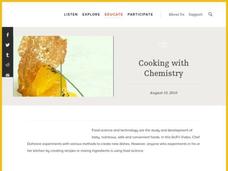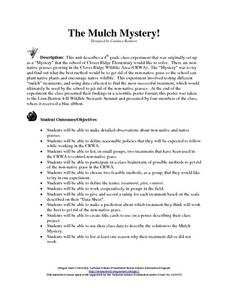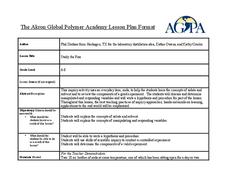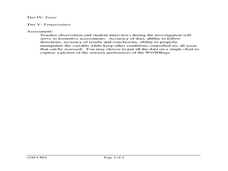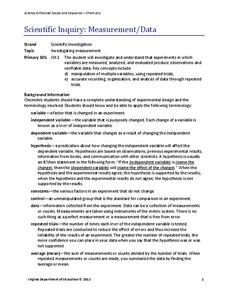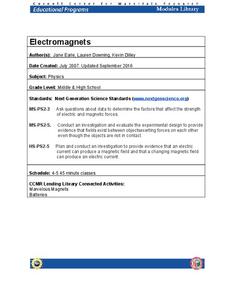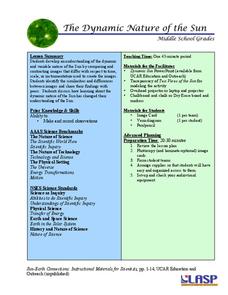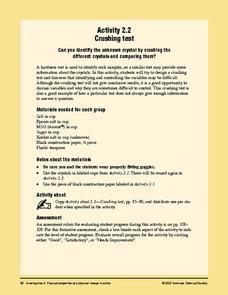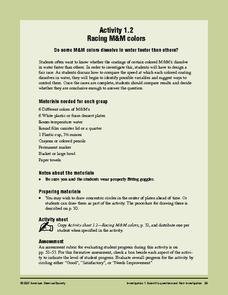Science Friday
Cooking with Chemistry
Use class time to perfect your hollandaise sauce with a chemistry lesson. It includes two activities to teach about immiscible liquids, emulsifiers, and creating a stable homogenous mixture. Young scientists first mix...
Curated OER
The Good and Bad Bacteria
Students are able to name one kind of harmful bacteria and why it hurts us and also name one kind of helpful bacteria and how we use it. They describe the process of growing bacterial cultures in a lab. Students create a reasonable...
Curated OER
The Mulch Mystery!
Fourth graders make a detailed observations about non-native and native grasses. They define reasonable policies that they expect to follow while working in the CRWA. Students list, in small groups, two treatments that have been used in...
Chicago Botanic Garden
GEEBITT (Global Equilibrium Energy Balance Interactive TinkerToy)
Young scholars use the GEEBITT excel model to explore how global average temperatures are affected by changes in our atmosphere in part two of this series of seven lessons. Working in groups, they discuss, analyze graphs, and enter data...
Curated OER
WS 7.4 Ideal Gas Law
In this ideal gas law worksheet, students solve eighteen problems using the ideal gas law to solve for moles of gases, temperature of gases, pressure of gases or volumes of gases.
Curated OER
Variable Skies
Students examine factors which affect a vortex and create model tornadoes. They identify variables, pose a testable question, and perform an experiment using the scientific method. After they collect their data, students write a complete...
Curated OER
Study the Fizz
Students experiment to determine which bottle of soda has more dissolved carbon dioxide. For this solutions lesson, students use the scientific method to test the amount of carbon dioxide in bottles of soda. They identify and explain the...
Curated OER
The Nature of Science and Technology
Second graders perform a variety of experiments to observe, form conclusions, and make inferences. In this experiment lesson, 2nd graders experiment based on the result of a pre-assessment. Students share what they have learned.
Curated OER
Teen Driving: Skills, Responsibilities and Reactions
As an introduction to the skills required for and responsibilities of driving, pre-teens and teens engage in a series of activities, chart their response times, and analyze how variables effect these reaction times. Class...
Virginia Department of Education
Atomic Structure: Periodic Table
The fifth lesson of seven in the series outlines an in-depth analysis of the periodic table. After direct instruction, pupils take turns practicing in the group before beginning independent study. The assessments include a...
Virginia Department of Education
A Crystal Lab
Young chemists grow ionic crystals, metallic crystals, and supersaturated crystals in three different lab experiments. Observing these under a microscope allows pupils to compare the various structures.
Virginia Department of Education
Scientific Inquiry: Measurement/Data
While pupils design their own lab experiments, they will not form a new species. Scholars take their materials and design an experiment regarding reaction rates.
NASA
Discovering the Milky Way
What do you call a tiny collection of galaxies? A puny-verse! Young scholars graph data gathered by scientists studying Cepheids. They attempt to identify a relationship between the variables through standard and logarithmical...
Cornell University
Electromagnets
Discover the connection between electric current and magnets. Scholars create electromagnets by passing a magnet through a coil. They experiment with different materials to determine the variables that affect the strength of the current.
NOAA
Vertebrates II
Mammals of the ocean unite! Or not. The 20th installment of a 23-part NOAA Enrichment in Marine sciences and Oceanography (NEMO) program investigates how warm-blooded marine mammals survive in water. In the class activity, learners use...
Cornell University
Making a Battery
Don't be shocked when your class has a blast making their own batteries! Science scholars examine a dry cell battery, then design and construct a wet cell battery. The activity guides them through the parts of a battery, the variables...
PHET
The Dynamic Nature of the Sun
In this second instructional activity of the series, pupils learn to observe similarities and differences in photos of the sun and record them in a Venn diagram. Then, small groups practice the same skill on unique images before...
American Chemical Society
Crushing Test
Solidify understanding of the properties of crystals by crushing them to compare hardness. After some class discussion, a procedure is planned, and then small groups go about making observations as they crush five different crystal...
NASA
Developing an Investigation
Watch as your class makes the transition from pupils to researchers! A well-designed lesson has scholars pick a solar wind characteristic to research. They then collect and analyze official data from the LANL website. This is the...
PHET
Planet Designer: Kelvin Climb
It's time to get those creative juices flowing! This second instructional activity in a series of five continues allowing pupils to design their own planets. It the same format as the first, but, this time, allows students to alter...
Beyond Benign
The Big Melt: Arctic Ice Caps
Are the Arctic ice caps really melting out of existence? Junior climatologists examine the statistics of ice decline through four math-based lessons. Each activity incorporates data, climate information, and environmental impact into an...
American Chemical Society
Racing M&M Colors
More than anything, this is great practice in scientific inquiry. After discovering that the color coating of an M&M® dissolves in water during a preceding activity, investigators now question whether or not the color makes a...
Science 4 Inquiry
The Ups and Downs of Populations
As the reality of population decline across many species becomes real, pupils learn about the variables related to changes in populations. They complete a simulation of population changes and graph the results, then discuss limiting...
Curated OER
Viewing Bacteria
Have you ever wanted to know the true structure of E.coli? Does the thought of peering into its "small world" sound exciting? Here is a lesson that allows pupils the ability to do just that. Blossoming microbiologists use...
